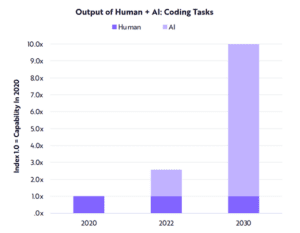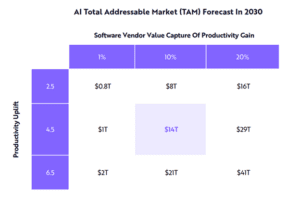Written by: Mike Curcurito, Dylan Sekuterski, ChatGPT
Artificial Intelligence (AI) is a crucial element driving technological advancements and enhancing human efficiency. It is projected that by 2030, AI has the potential to increase the productivity of knowledge workers by more than 4-fold. In the event of 100% adoption, AI can increase global labor productivity by approximately $200 trillion, surpassing the total knowledge worker salaries of around $32 trillion.
As individuals become more acquainted with these technologies, it is possible to reduce time spent on tasks by 50% or more, since manual analysis and operations will be automated. An example of this can be seen in the context of AI tools for coding, where a human’s overall task time was reduced from four hours to approximately two hours. The possibilities are immense, as with improved technology and increasing familiarity with AI tools, most tasks can potentially be automated, leading to even further time reduction. Based on a 70% annualized drop in training costs and feedback loops, AI coding assistants like Copilot could increase the output of software engineers about 10-fold by 2030.

AI training costs are decreasing rapidly at a rate of about 70% per year. MosaicML has released AI training tools that can train language models to GPT-3 level performance for $450,000, which is one-tenth of the cost of two years ago.
Additionally, AI hardware and software costs are expected to decline by 57% and 47%, respectively, at annual rates, as per Wright’s Law. The convergence of hardware and software could lead to a 70% reduction in AI training costs at an annual rate through 2030.

If vendors capture 10% of the value created by their products, AI software could generate up to $14 trillion in revenue and $90 trillion in enterprise value by 2030.
One of the major challenges we are likely to face in society is the increasing obsolescence of certain job types because of the widespread adoption of AI technologies. For example, a graphic designer’s job can be replaced by AI, given that the cost of a human graphic designer is around $150 for five hours, while a generative AI tool can create an image in less than a minute for only eight cents.
The potential for AI to replace unskilled workers is also a matter of concern. As more unskilled workers are replaced by AI, discussions on living wages or other forms of payments for displaced human workers will be necessary. It will also be important to establish limits on the types of jobs that can be replaced by AI, as we have seen in the fast-food industry, where several positions have already been replaced by machines.
The potential of AI to drive productivity and efficiency is immense, and its benefits are projected to increase in the coming years. As AI continues to improve, it has the potential to replace certain types of jobs, resulting in significant social and economic impacts. Therefore, it is essential to consider the ethical implications of AI technology and the potential consequences of its widespread adoption. Governments, businesses, and individuals must work together to ensure that AI is used ethically and responsibly to promote the greater good while minimizing the negative impacts on society.
This is one piece in a series covering ARK Invest’s “Big Ideas” for 2023 — head to our table of contents to read more! And thanks to ChatGPT for helping us streamline this article!